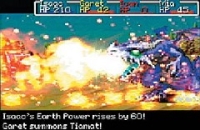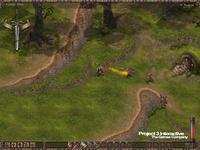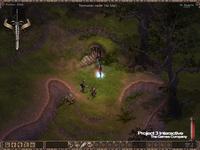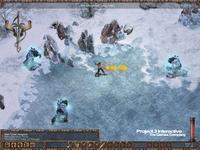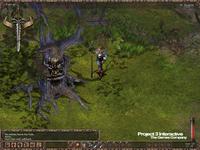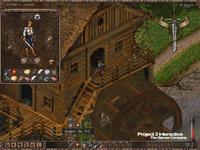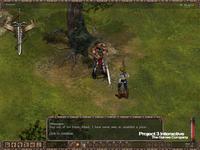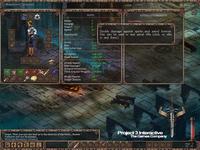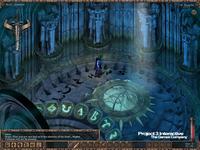|
|
|
Main News Forums Games Games Database Top 100 Release List Support Files Features Reviews Previews Interviews Editorials Diaries Misc Download Gallery Music Screenshots Videos Miscellaneous Staff Members Privacy Statement |
Kult: Heretic Kingdoms - Interview
Kult: Heretic Kingdoms has been in development at 3D People for a while, starting out as an action-RPG named 'Cult' but ultimately developing into a deeper game. While the accent remains on action, Kult features some interesting twists and efforts have been made to create a compelling story. We had the opportunity to speak to 3D People and dialogue consultants, International Hobo. RPGDot: Please introduce yourself and tell us a little about 3D People.
Peter Nagy: I'm the lead artist at 3D People. We're a Slovakian developer with an emphasis on RPG games. Project 3 are our publishers, who are one of the fastest growing publishers in Europe. Jan Turan: And I'm the lead programmer here at 3D People. This game is our first major project, although we are already thinking ahead to future RPG projects.RPGDot: Can you give us an overview of Kult? What makes it different?
Peter: The game is a story-driven computer RPG. It's built around a 3D engine which uses an isometric projection for ease of play, but looks much better than people have come to expect from isometric games. The game is centered around one character, although you interact with a lot of other people, some of which will join you at certain places in the story. Chris: There are a number of things that make this game different from most PC RPGs. There is the Attunement system, which harnesses the addictive power of ability progression with an adaptive framework. That's a fancy way of saying that if you make a mistake in how you specialise your character, it's easy to rectify, and you won't have to consider reloading to explore different options. The game also has an unusual healing system which means the player doesn't need to stockpile potions - they can focus on battle tactics and adventuring. This gives a different psychology to adventuring - it's a case of how far from safety can you afford to venture before you're too beaten up and your field medicine isn't good enough anymore. It can get quite tense if you're deep in hostile territory and you're in bad shape! Players can always choose to play it safe and camp often, however. Richard: There's also a nice dialogue engine which allows the quests to unfold in different ways. You can choose how you interact with the people in the world - it's up to you if you want to be loyal or a betrayer. The characters react differently to you according to how you treat them.RPGDot: An early interview I read stressed the streamlined action-adventure nature of Kult but recently there seems to be more emphasis on story. Is Kult a deeper game than originally envisioned? Have the RPG elements been strengthened?
Chris: You should never trust early interviews - the process of game design can be very flexible, especially with first time developers. Peter: There's definitely more of a focus on RPG elements now, and it is definitely a story-oriented game. Richard: The game is somewhere between a Western PC RPG and a Japanese console RPG in some respects. It's a unique balance that I think has worked out very nicely.RPGDot: What can you tell us about the story and setting? Richard: Kult is set in the Heretic Kingdoms - a land in which religion is outlawed. The player takes the role of a member of the Inquisition, an organisation which polices the kingdoms to prevent religion regaining a foothold. Searching for a powerful artefact, the player comes into contact with a religious cult, and is forced to reconsider their own belief systems, before making the ultimate choice. The history of the Heretic Kingdoms has been created in some detail - the game begins some years after the overthrow of a despotic ruler, and the land is still in political turmoil. As the player explores, they will see the effects of this political situation upon the different races within the land, and will have choices to make regarding who to help and who to hurt. It's up to the player as to how much of the story they explore - the core story can be enjoyed as a fantasy adventure, but there are many historical and political details to discover for players who like that sort of thing.RPGDot: Please tell us about character creation and development. What are the main attributes; does Kult use a class or skill system and what sorts of skills or feats are available?
Chris: The Attunements system comprises the core of the game play. In the world of the Heretic Kingdoms, mages become synchronised to the essential nature of objects in the world - thus unlocking powers known as Attunements. These Attunements take the place of a skill system - different Attunements may be used offensively or defensively in combat, or grant magical powers, or provide other advantages… there are around one hundred Attunements in all in the game, and they can be combined in a number of different ways. Richard: This makes character development incredibly flexible. Although players can only use a certain number of Attunements at any one time (which increases as the player levels up), the actual Attunements that are active can be changed frequently. This allows players to change their character set up for specific missions and situations - or, if they prefer, develop a character with a single role. The idea is to put character choice in the player's hands at all times. The testing team is constantly coming up with new combinations of Attunements that the design team didn't anticipate, to give their characters an extra edge - it'll be interesting to see what players can do with the system.RPGDot: How important are non-combat skills to the gameplay? Are there any speech or diplomacy skills, for example? Richard: In order to keep the story tight, character based skills have been omitted. This is not to say that diplomacy isn't important, however - players will have many choices to make throughout the game, as to which allies they side with and which enemies they make. We prefer to put the player in control of the diplomacy aspects, rather than have a skills system make certain routes impossible under arbitrary circumstances. Jan: Kult is an action-oriented game, at heart. The Attunements system has been designed to give players maximum choice, and a high level of strategy and fun within the combat elements, and so non-combat skills are of lesser importance. Chris: It's worth noting than in games with a fixed Diplomacy skill, this can limit player flexibility - as this usually restricts conversation options unless the player gives up other advantages to invest in the Diplomacy skill. We've preferred to create variety in the dialogue space as a result of the player's choices and actions - this is closer to how this sort of thing works in many tabletop RPG systems. Resolving interpersonal situations by the equivalent of a die roll can be very unsatisfying.RPGDot: Although Kult is not party-based, I believe NPCs may join the main character at times. Can you elaborate on this?
Richard: The story of the game provides almost as many potential allies as it does enemies for the player. Certain characters will join the player, or help the player, or even hire the player, depending upon the circumstances. However, the player cannot control these characters or their actions, they can only influence them by their choices within the game world.RPGDot: Combat is real-time action-based. What will you be doing to make combat interesting? Are there any tactical elements? Chris: The Attunements system provides great depth of strategy in combat. The player may set their character up in so many different ways, that it is possible to optimise combat tactics for any given situation. Alternatively, a player may prefer to develop a general strategy based upon creating an ‘all round' character, who can deal with anything. Jan: There is also some tactical elements resulting from the player character's ability to switch into a parallel dimension more or less at will. Some creatures appear only in the real world, and some only appear in this Dreamworld - which means you can use this world to tactical advantage. For instance, an archer probably does not have access to the Dreamworld, so if you are pinned down by archers, simply phase into the Dreamworld, position yourself to attack from behind and strike them down! Chris: Additionally, all enemy populations in the game are reactive. If the player clears out an area of the game world of one type of enemy, another type may move in to take their place. For example, early in the game there is a Taymurian woodland outpost. (The Taymurians are a wolf-like race in the world of Heretic Kingdoms). Once the Taymurians have been wiped out, when you come back later it will have repopulated according to the circumstances in the surrounding area. You might come back to find that wolves and bears have moved in - or the Taymurians may have attempted to re-establish the outpost. So the player's choice of what to kill can also be strategic.RPGDot: The interface is often an impediment to realtime combat achieving good depth - for example, it's often hard to select from different attacks or combos in real time. Is this an issue for Kult? Do you have any different approaches to the interface?
Chris: Interface issues are vital to making a game fun to play. By centring combat strategy within the Attunements system, many player choices are made before combat begins, meaning that strategy is possible without many interface buttons being required. Many Attunements involves an elemental magic system, for instance - if they player requires an elemental attack at any time, and have the relevant Attunement assigned, they merely select an elementally attuned weapon from the customisable inventory to attack in that way. Jan: Yes, there are quick slots for you to easily switch weapon from - and these allow you to have different tactical plans available, depending on how you have configured your Attunements. You could, for instance, have a bow, a magical focus and a sword in your quick slots, set up your magical Attunements for when you are surrounded, your bow Attunements for long range sniping and your melee Attunements for defence. In this way, choosing your weapon is really making a significant tactical choice. We've worked hard to create an intuitive interface. All inventory and combat options are easily available to the player via mouse and hot-key systems.RPGDot: How does magic work? Are there different schools or circles and can you give us some examples of interesting spells? Chris: Again, the Attunements provide for magical options. The player may acquire elemental Attunements from certain items, which work in conjunction with magical focuses to provide spell effects. There are five types of magical Attunement - four elemental paths, and neutral magic, such as the Defensive Aura type Attunements, which provides protection but are only active if the player is wearing no armour. Peter: The majority of spell effects are combat-oriented. There is an excellent range of eye-pleasing effects within the game, and the screen can be packed with magical projectiles at times. It gets pretty spectacular.RPGDot: What sort of NPC interactions will players experience? How does the dialogue system work?
Richard: There are many NPCs to talk to and interact with. The dialogue system presents the player with relevant questions to ask of characters. Quests develop organically from this conversation system, and different NPCs will react in different ways to player actions. Of course, certain characters are more central to the story than others. How the player chooses to interact with the more powerful NPCs will determine the eventual outcome of the story…There are six different ways the ending can resolve, depending upon how you interact with the characters within the game.RPGDot: Please describe the quest system. What sort of quests will players undertake and are there multiple solutions to quests? Chris: There are numerous quests within the game. All of the quests are tied into the political situation, and every action the player takes has some impact upon the game world, sometimes minor, sometimes very major. The quests are quite varied, and can often be approached in different ways, depending on who the player has chosen to help, or what their goals are. Richard: Just as an example, the player is required at one point to resolve political conflict between underworld factions. The player has free choice as to how to do this, and may ally themselves with one side or the other, stay neutral, or even worm their way into the trust of one side and then betray them. It's the player's choice as to whether the ends justify the means or not…RPGDot: What is the balance between combat and exploration or NPC interaction? Which aspect of gameplay is the focus?
Jan: Combat is the focus of the game, and the Attunements system gives as many player options as possible in this area. It makes finding new equipment as exciting as it should be all the way through the game. But exploration and NPC interaction always provide reasons for the combat - the player is always aware of their role within the world, and has responsibilities that they may fulfil or avoid.RPGDot: I read no two enemies look alike, which sounds like an interesting feature. Can you expand on this? What sort of enemies will players encounter? Peter: The enemies are created dynamically, from component elements. So, for instance, each Taymurian is built out of different Taymurian components, and equipped accordingly. Chris: We've made it so that equipment relates to the circumstances of the creatures and people. So, for instance, Taymurians are mostly armed with weapons of Taymurian manufacture - although raiders deep into enemy territory may find themselves equipped with whatever happens to be at hand. There is a definite logic to equipment in this game.RPGDot: How many maps or areas are there and what sort of environments will players experience? Peter: I'm not sure of the exact number of maps - and it's hard to give a definite figure, because some areas use multiple maps. I think it's somewhere around fifty in total. There are lots of environments covering all the classic climates. Richard: Great care has been taken to make sure that the game world makes logical sense. Each of the different areas have specific roles within the world of the Heretic Kingdoms, and all make sense in terms of the story. Although exploration is important to the game, the player is always aware of why they are where they are… something that sometimes gets lost in epic RPGs.RPGDot: The screenshots for Kult look great - please tell us a little about the graphics engine.
Jan: The engine is 3D isometric engine with full support of hardware accelerated features like low poly models, dynamic particle systems, colored lighting (used mostly for spells and day/night change), smooth scrolling and zoom. The weather effects include rain, snow, storm, fog, sandstorm and others. The engine supports unlimited map size and shape, multi-layered high detail terrain and is built with an integrated toolset where you can change, add and create virtually anything. We might decide to ship the game with the toolset to encourage a mod community.RPGDot: What about sound and music? Will dialogues be voiced? Peter: The music is provided by Clockwork Productions. We're really pleased with the audio they've provided for the game. Richard: Due to the sheer volume of dialogue in the game, it was not efficient to record it - this is usually the case for computer RPGs. It's actually an advantage that its not recorded, as it means you can click through dialogue at your own pace, rather than sitting around waiting for to dialogue to finish playing. However, narration duties in the game are fulfilled spectacularly by Tom Baker, and voices don't come much better than that.RPGDot: Would you like to make any closing comments? Jan: Please buy our game? *laughs* Peter: We've really enjoyed making this game, and we're really happy with the partner companies that have worked with us to get the game together. That includes the publisher, Project 3, who have been very supportive of the needs of the game - although always playing strict attention to the development schedule, since no-one likes a game that slips. If players get half as much enjoyment from playing the game as we have from making it, I will be very happy. Richard: I hope our goal of maximising the fun features of this style of RPG in recognisable yet fresh ways is successful. We're looking forward to seeing what players make of the game systems - the flexibility of the game leads us to expect to pretty interesting player discoveries that we haven't even considered! We also hope that the story is enjoyed, as a lot of work has gone into making it fresh and exciting whilst given as much choice as possible to the player. Chris: I've been looking for a computer RPG project for our team to work on for a while now, and I'm glad that 3D People came to us. I think that International Hobo and 3D People will have a long future together, and we welcome feedback from the consumers once the game is on sale - we make games for the audience, so don't be shy in letting us know what you think!Thanks to Peter, Jan, Chris and Richard for answering our questions. We wish them all the best with the development.
Average Reader Ratings: 6.92 (26 votes) |
||||||||||||
|
All original content of this site is copyrighted by RPGWatch. Copying or reproducing of any part of this site is strictly prohibited. Taking anything from this site without authorisation will be considered stealing and we'll be forced to visit you and jump on your legs until you give it back. |
||




